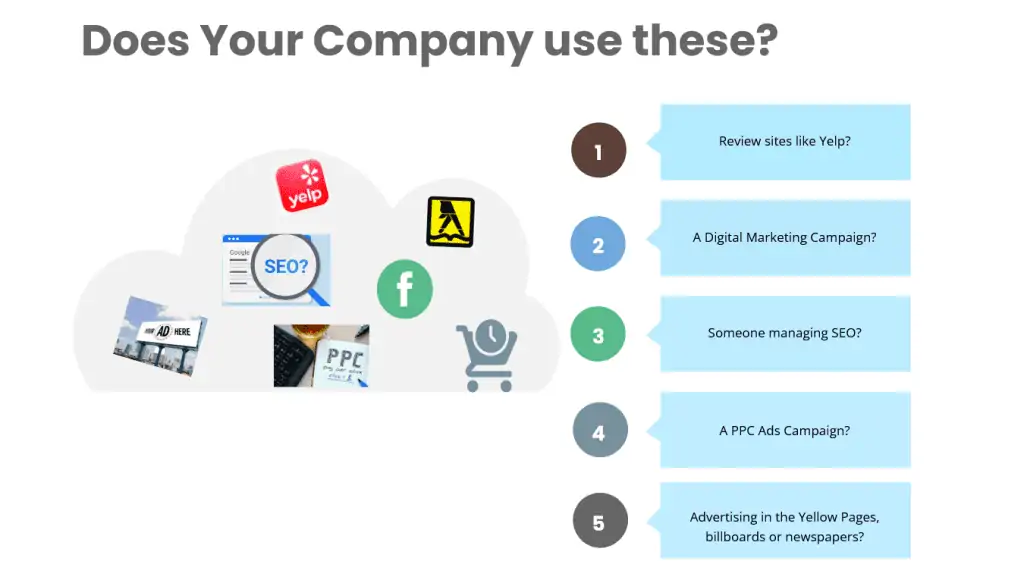Last Modified on November 1, 2024
Are you a business owner looking for ways to improve your sales? Do you want to get insights into your business to understand your clientele? Are you interested in boosting your marketing strategy?
If so, you should try Google Analytics!
If you’re not using it already, you’ll be surprised about all that Google Analytics can do for you.
When properly implemented, this data measuring tool can make the difference between a successful business with a good ROI and investments that may not bring back any revenue.
In this post, we’ll discuss what Google Analytics is used for and why it is important, even for small local businesses.
Here are the 3 benefits of Google Analytics:
So, let’s get started!
What is Google Analytics Used For?
Google Analytics is a free web analytics service that collects data from your website and apps that provide insights into your business.
While a lot of people understand that Google’s services bring them a lot of business, some feel restricted in being tied to Google and are not fond of being told what to do.
For instance, Google’s decision to no longer process new hits for Universal Analytics properties forced long-time users to migrate to the new Google Analytics 4. This caused quite a stir and is a clear example of the love-hate relationship users have with Google.

Despite its issues, the purpose of Google Analytics is to help make your website as profitable as it can be. The more profitable your business is, the more likely you are to spend money on other Google services.
After all, they are a business like any other, and giving you the tools to make your business successful eventually contributes to their success.
🚨 Note: Check out our guide and learn how to add Google Analytics 4 tracking to your website.
Should You Use Google Analytics?
Determining if you should use Google Analytics is dependent on the advertising techniques you use for your business.
- Does your company use review sites like Yelp and Foursquare?
- Do you use a digital marketing campaign – advertising on Facebook, or posting on Instagram?
- Do you implement SEO techniques to try and get your website to rank higher on Google?
- Are you running a pay-per-click (PPC) advertising campaign using Google, Bing, Yellow Pages, or other similar services?
- Are you advertising anywhere like on billboards, Yellow Pages, newspapers, or TV?

If you do advertising along these lines, the key to achieving success is to understand the data you gather. Peter Drucker, a famous management consultant, emphasizes that you can’t improve what you don’t measure.

To help businesses measure what is successful is the crux of why MeasureSchool was started.
This is where we would like to highlight the importance of Google Analytics as it provides an avenue for business owners to measure and analyze their website and app data.
Now, let’s discuss the ways Google Analytics can help improve a business owner’s website.
Improved SEO Performance
The first on the list of the benefits of Google Analytics is its ability to help improve your SEO performance.
If you’re trying to make your website rank higher on Google, you’re probably looking into some SEO techniques. Whether you’re doing it yourself or have hired somebody else to do it, SEO is better done with Google Analytics.
How is that?

Find New Keywords
Firstly, it helps you find new keywords that your visitors are using.
Say you’re trying to rank for keyword X. Using Google Analytics, you find out that a majority of users are searching for keyword Y on Google to find your website. This information can be easily attained using Google Analytics.
Top Performing Pages
Next, it allows you to see your top-performing pages.
Google Analytics allows you to know how successful your pages are, and which ones get a lot of visitors and are making sales.
Knowing which pages do well allows you to determine what contributed to those pages’ success and helps navigate your next advertising moves.
Organic Visits vs. Branded Visits
Google Analytics also lets you compare organic visits with branded visits.
For instance, people typing in MeasureSchool are likely familiar with and specifically looking for our brand. Since it is a branded term, we don’t necessarily have to worry about ranking.
What we do want to know is when people search for Google Analytics 4, different keywords around GA4, and other digital marketing topics. These are non-branded or organic terms.
Being able to compare our visitors allows us to ensure that our SEO efforts are working out.
Track SEO Keywords and Pages
Lastly, GA allows us to track those SEO keywords and pages.
After you’ve made changes, you need to know if there are any improvements – are more people coming in? The easiest way to do that is to go to your analytics report.
Since it is tied to the search console, you can also find your average ranking data in Google Analytics. You would be able to see a graph that shows your improvement over time while doing SEO.
More Effective PPC Ads
Next on our list of the benefits of Google Analytics is its ability to make your PPC ads more effective. Let’s find out how!

Know User Demographics
Running an effective PPC campaign is dependent on how well you know your clientele.
Google Analytics has a section that shows you basic user demographics like their age, gender, device, interests, and location. This information is valuable for you to target the right people and make your advertising more effective.
Report Goals and Conversions
With Google Analytics, you can specify the goals you’re trying to accomplish and easily view reports to see if you’re reaching them.
Let’s say you want to increase your sales. If the user successfully made a purchase and reached the order complete page, this will be recorded as a conversion.
Conversions can be any event-based action that the user takes: a page view, purchase, or scroll activity, to name a few.
When you’re spending money to get visitors to come to your website, you want to know if you are reaching your goals – are you seeing enough conversions? Many small business owners decide to spend money on ads but have no idea if they’re working properly.
Not tracking your ads essentially makes them ineffective. Google Analytics has multiple pre-built reports, like the funnel exploration report. You can view that it not only summarizes your data but also provides additional insights.
Identify Negative Keywords
If you’re using Google Ads, Bing Ads, or other online advertising tools, you have an opportunity to specify the keywords you don’t want your ads to show up for.
🚨 Note: If you’re running your ads using Google Ads, check out our guide on how to link Google Ads to Google Analytics.
Based on the people that are converting, Google Analytics can tell you the negative keywords that you shouldn’t advertise for. You can then pull out these keywords on your advertising tool and save a ton of money as a small business owner.
Improved Digital Marketing Strategy
Finally, Google Analytics can help push you forward to have a better digital marketing strategy.

Learn Social Platforms to Target
You can go to Google Analytics and find out where your users are coming from.
If you’re getting 80% of your website traffic from Tiktok, then you should keep driving different videos on the platform to keep these users coming to your website.
For the ones that don’t attract enough traffic, you might want to consider changing your strategy or reconsider targeting them at all.
Identify What Channels Drive Buyers
While higher traffic oftentimes contributes to increased conversions, knowing where buyers are coming from is a much more direct approach to help increase your sales.
Going back to the earlier example, let’s say that the majority of your traffic does come from Tiktok, but only a few make a purchase.
On the other hand, only a handful of visitors come from Facebook, but if almost all of them become buyers, then you shouldn’t neglect this channel.
Therefore, you should advertise more and do more digital marketing strategies on the channels that drive buyers and Google Analytics can point out these channels for you.
🚨 Note: Check out our guide to digital marketing measurement and master the art of measuring marketing activities.
Know What Content People Like
Google Analytics has multiple metrics that can help you determine what content people like.
If you find that people are enjoying certain Facebook posts more or some Instagram pictures do better, then you should continue to put these types of posts on your social media sites.
Knowing the type of content people like can help make your campaign more successful.
Create Cross-Selling Opportunities
Finally, Google Analytics helps you create cross-selling opportunities.
Let’s say you sell cosmetic products and have an online or local makeup store. A customer comes in and buys a blush and lipstick. Later, you find another customer buying the same pair of products, and using Google Analytics, you see that this has happened multiple times.
This tells you that these two items may have a relationship. That’s why your buyers tend to buy them together.
So, you can go on your buy pages and create a section that lets users see the products that people often buy together with the ones they are viewing.
FAQ
Why should I use Google Analytics?
Google Analytics is essential for businesses looking to improve their online performance and marketing strategies. It helps you understand your website visitors, track user behavior, measure advertising effectiveness, and make data-driven decisions to optimize your online presence.
How can Google Analytics improve SEO performance?
Google Analytics offers valuable SEO insights by helping you discover new keywords, identify top-performing pages, compare organic and branded visits, and track SEO keywords and pages. These insights allow you to refine your SEO strategies and improve your website’s visibility in search engine results.
How does Google Analytics make PPC ads more effective?
By using Google Analytics, you can gain a deeper understanding of your target audience through demographic data. It also enables you to set and track goals and conversions, measure the success of your PPC campaigns, and identify negative keywords to refine your ad targeting and save costs.
Summary
Alright! We hope it is clear what Google Analytics is used for. Using Google Analytics allows you to measure and understand data about your users. This leads to valuable insights that you can use to make improvements to your website and have a profitable business.
Ready to start using Google Analytics? Check out our guide on how to track events with Google Analytics 4 and Google Tag Manager and our Google Analytics 4 tutorial.
Do you think your business needs Google Analytics? What Google Analytics feature did you find the most interesting or helpful for your business? Let us know in the comments below!







You have mentioned many different ways on how google analytics helps you to measure and improve website engagement. I would also like to mention some of them more which can be very usefull for your readers. Check out them below:
1. Analyze referral sources
2. Use heatmaps
3. Conduct A/B testing
4. Monitor mobile engagement
5. Analyze site search
These were some of the ways which google analytics can help. But once you analize your website you need to take action on improving it.